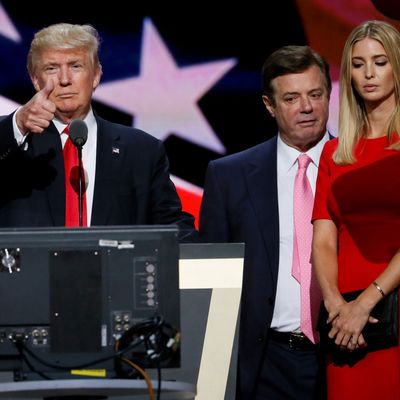
It is typically considered a bad sign for the president of the United States when his campaign manager is arrested for federal crimes. But President Trump and his defenders have instead presented yesterday’s indictment of Paul Manafort as a relief. “None of the Manafort indictment as we sit here today has a single thing to do with Donald Trump, with the Trump campaign or with Russian collusion,” exclaims Rush Limbaugh. “Manafort. On tax charges going back 10 yrs. … No ‘collusion.’ No relevance to Trump,” gloats Ann Coulter. “The most striking news is that none of this involves the 2016 election campaign. The indictment makes clear that Mr. Manafort’s work for Ukraine and his money transfers ended in 2014,” reports an almost gleeful Wall Street Journal editorial.
It is true that the crimes Manafort was charged with yesterday, by themselves, do not implicate Trump. But the notion that his indictment signals nothing particularly troubling for the president and his campaign requires a myopic refusal to consider anything that happened either before or after Manafort ran Trump’s campaign.
Here are a few key pertinent facts about Manafort’s service to Trump. First, Vladimir Putin’s Russia has a history of aiding pro-Russian populist-nationalist parties in overseas elections. Second, Manafort ran just such a campaign in Ukraine before coming over to work for Trump.
What’s more, in 2005, Manafort had pitched a plan to offer political services to “greatly benefit the Putin Government” and that would operate “at the highest levels of the U.S. government — the White House, Capitol Hill and the State Department.” Manafort was deeply in debt to an oligarch operating on behalf of the Russian government. And during his time on the campaign, he tried to ask that oligarch if his service would enable Manafort to “get whole.”
This fact pattern alone, which was evident at the outset of his work for Trump, implies at the very least a strong suspicion that Manafort’s direction of the Trump campaign was the same kind of pro-Russian influence operation he had carried out in Kiev.
Trump’s relationship with Manafort also runs deeper than the president’s defenders care to admit. Trump was the first client signed up by Manafort when he opened up a lobbying shop with Roger Stone in 1980. (Stone, of course, had a back channel to the cutout used by Russia to disseminate stolen Democratic emails for Trump’s benefit.) At the time he was running the campaign, Republicans praised his influence. “Nobody should underestimate how much Paul Manafort did to really help get this [Trump] campaign to where it is right now,” insisted Newt Gingrich in August 2016. And even after revelations about Manafort’s secretive work in Ukraine forced him out of the campaign, he continued to speak with Trump for months, past the inauguration.
Yes, his alleged money-laundering schemes do not by themselves answer the question of whether Manafort was helping to manipulate an American presidential election on behalf of his Russian paymasters. But his arrest for money laundering, and his potential need to provide other incriminating details to avoid prison, certainly increases the potential that such a plot will be uncovered. To assume money laundering must be the only bad thing Manafort has done is the sort of heroic optimism the Trumpian right has clung to from the beginning. Bad people who commit crimes in a regular course of their business might actually have something to hide.






























